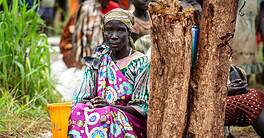Global economic freedom has taken a sustained hit thanks to the aftershocks of the Covid-19 pandemic.

New ideas are born every day in homes, schools, workplaces. They can further human development, improve our health and environment, create jobs and wealth. In order for these ideas to turn into reality individuals must be free to work, consume and invest without restrictions. This is the focus of the Index of Economic Freedom, an annual ranking produced by the Heritage Foundation which measures the level of economic freedom in countries around the globe.
The link between economic freedom and human well-being is proven. The adoption of progressive and transparent economic policies often translates into a significant reduction in poverty, sicknesses and ignorance. Since the inception of the ranking in 1995, economic freedom around the world has generally increased. Just three years ago, Heritage Foundation researchers could claim that the global average economic freedom score was at its highest in the history of the index. Then came the Covid-19 pandemic, its economic aftershocks, and the Russian invasion of Ukraine.
The government-imposed fiscal burdens and restrictions on the movement of people and business activity that characterized lockdowns caused severe harm to the global economy according to the Heritage Foundation. Out of 184 nations surveyed in the new edition of the report (which considers economic policies and conditions in the interval between July 1, 2021, through June 30, 2022), declines in economic freedom were registered by 115 of them, 8 were unchanged, and 8 nations could not be graded due to a lack of reliable data.
But how does the Heritage Foundation measure economic freedom in each given country? Twelve are the factors related to four key aspects of the economic environment that are graded from 0 to 100 and averaged to determine a country’s score: rule of law (and related sub-categories: property rights, government integrity, judicial effectiveness); government size (government spending, tax burden, fiscal health); regulatory efficiency (business, labor and monetary freedom); open markets (trade, investment and financial freedom). Overall, the global average score in this year’s ranking was 59.3, corresponding to a 0.7-point decline from the period before and the lowest ever recorded during the past two decades.
Only 4 countries (down from 7 in the previous edition of the report) achieved economic freedom scores of 80 or more and are thus considered economically free; 23 nations were ranked as “mostly free” with scores ranging from 70.0 to 79.9; and 56 were deemed “moderately free,” with scores of 60.0 to 69.9. Alarmingly, 93 nations—or 50% of all the nations ranked—registered economic freedom scores below 60: of those, 65 are considered “mostly unfree” (scores of 50.0 to 59.9), while in the economically “repressed” category can be found 28 countries, including China. Yet, it is also worth noting that China’s chief antagonist has not many reasons to celebrate: the U.S. is only the world’s 25th freest economy. Its score has plummeted to 70.6, a 1.5-point decline from the 2022 edition of the ranking, making it America’s lowest score ever in the 29-year history of the index.
As the freedom to participate actively and fully in the economy deteriorates worldwide, many hard-fought gains in all areas of civil society appear to be in jeopardy. According to the experts at the Heritage Foundation, the benefits of economic freedom go far beyond just higher incomes or reduced levels of poverty. Countries that aim for higher levels of economic freedom enjoy down the road superior levels of overall human development as measured by the United Nations Human Development Index (HDI). Remarkably, it is often the policies that governments fail to implement—rather than the counterproductive ones that are put in place—that can be the most damaging to economic growth. By providing greater economic freedom today, governments can improve educational opportunities and their citizens’ living standards tomorrow.
Rank |
Country/Territory |
Economic Freedom Score |
| 1 | Singapore | 83.9 |
| 2 | Switzerland | 83.8 |
| 3 | Ireland | 82.0 |
| 4 | Taiwan | 80.7 |
| 5 | New Zealand | 78.9 |
| 6 | Estonia | 78.6 |
| 7 | Luxembourg | 78.4 |
| 8 | Netherlands | 78.0 |
| 9 | Denmark | 77.6 |
| 10 | Sweden | 77.5 |
| 11 | Finland | 77.1 |
| 12 | Norway | 76.9 |
| 13 | Australia | 74.8 |
| 14 | Germany | 73.7 |
| 15 | South Korea | 73.7 |
| 16 | Canada | 73.7 |
| 17 | Latvia | 72.8 |
| 18 | Cyprus | 72.3 |
| 19 | Iceland | 72.2 |
| 20 | Lithuania | 72.2 |
| 21 | Czech Republic | 71.9 |
| 22 | Chile | 71.1 |
| 23 | Austria | 71.1 |
| 24 | United Arab Emirates | 70.9 |
| 25 | United States | 70.6 |
| 26 | Mauritius | 70.6 |
| 27 | Uruguay | 70.2 |
| 28 | United Kingdom | 69.9 |
| 29 | Barbados | 69.8 |
| 30 | Portugal | 69.5 |
| 31 | Japan | 69.3 |
| 32 | Bulgaria | 69.3 |
| 33 | Slovakia | 69.0 |
| 34 | Israel | 68.9 |
| 35 | Georgia | 68.7 |
| 36 | Qatar | 68.6 |
| 37 | Slovenia | 68.5 |
| 38 | Samoa | 68.3 |
| 39 | Jamaica | 68.1 |
| 40 | Poland | 67.7. |
| 41 | Malta | 67.5 |
| 42 | Malaysia | 67.3 |
| 43 | Belgium | 67.1 |
| 44 | Peru | 66.5 |
| 45 | Costa Rica | 66.5 |
| 46 | Croatia | 66.4 |
| 47 | Cabo Verde | 65.8 |
| 48 | Brunei Darussalam | 65.7 |
| 49 | Albania | 65.3 |
| 50 | Armenia | 68.2 |
| 51 | Spain | 67.9 |
| 52 | Botswana | 64.9 |
| 53 | Romania | 64.5 |
| 54 | Hungary | 64.1 |
| 55 | Panama | 63.8 |
| 56 | North Macedonia | 63.7 |
| 57 | France | 63.6 |
| 58 | Serbia | 63.5 |
| 59 | Saint Vincent and Grenadines | 63.5 |
| 60 | Indonesia | 63.5 |
| 61 | Mexico | 63.2 |
| 62 | Colombia | 63.1 |
| 63 | Bosnia and Herzegovina | 62.9 |
| 64 | Guatemala | 62.7 |
| 65 | Dominican Republic | 62.6 |
| 66 | Micronesia | 62.6 |
| 67 | The Bahamas | 62.6 |
| 68 | Bahrain | 62.5 |
| 69 | Italy | 62.3 |
| 70 | Vanuatu | 62.1 |
| 71 | Kazakhstan | 62.1 |
| 72 | Vietnam | 61.8 |
| 73 | Mongolia | 61.7 |
| 74 | São Tomé and Príncipe | 61.5 |
| 75 | Azerbaijan | 61.4 |
| 76 | Paraguay | 61.0 |
| 77 | Montenegro | 60.9 |
| 78 | Kosovo | 60.7 |
| 79 | Saint Lucia | 60.7 |
| 80 | Thailand | 60.6 |
| 81 | Côte d’Ivoire | 60.4 |
| 82 | Tongoa | 60.0 |
| 83 | Tanzania | 60.0 |
| 84 | Benin | 59.8 |
| 85 | Belize | 59.8 |
| 86 | Dominica | 59.7 |
| 87 | Seychelles | 59.5 |
| 88 | Trinidad and Toba | 59.5 |
| 89 | Philippines | 59.3 |
| 90 | Bhutan | 59.3 |
| 91 | Madagascar | 58.9 |
| 92 | Kiribali | 58.8 |
| 93 | Jordan | 58.8 |
| 94 | Honduras | 58.7 |
| 95 | Oman | 58.5 |
| 96 | Moldova | 58.5 |
| 97 | Morococco | 58.4 |
| 98 | Saudi Arabia | 58.3 |
| 99 | Ghana | 58.0 |
| 100 | Fiji | 58.0 |
| 101 | The Gambia | 57.9 |
| 102 | Namibia | 57.7 |
| 103 | Senegal | 57.7 |
| 104 | Turkey | 56.9 |
| 105 | Guyana | 56.9 |
| 106 | Solomon Islands | 56.9 |
| 107 | Greece | 56.9 |
| 108 | Kuwait | 56.7 |
| 109 | Uzbekistan | 56.5 |
| 110 | Cambodia | 56.5 |
| 111 | Burkina Faso | 56.2 |
| 112 | Djibouti | 56.1 |
| 113 | Gabon | 56.1 |
| 114 | El Salvador | 56.0 |
| 115 | Kyrgyz Republic | 55.8 |
| 116 | South Africa | 55.7 |
| 117 | Mauritania | 55.3 |
| 118 | Togo | 55.3 |
| 119 | Ecuador | 55.0 |
| 120 | Eswatini | 54.9 |
| 121 | Nicaragua | 54.4 |
| 122 | Mali | 54.5 |
| 123 | Bangladesh | 54.4 |
| 124 | Nigeria | 53.9 |
| 125 | Russia | 53.8 |
| 126 | Niger | 53.7 |
| 127 | Brazil | 53.5 |
| 128 | Comoros | 53.5 |
| 129 | Guinea | 53.2 |
| 130 | Angola | 53.0 |
| 131 | India | 52.9 |
| 132 | Tunisia | 52.9 |
| 133 | Malawi | 52.8 |
| 134 | Mozambique | 52.5 |
| 135 | Kenya | 52.5 |
| 136 | Sri Lanka | 52.2 |
| 137 | Rwanda | 52.2 |
| 138 | Chad | 52.0 |
| 139 | Cameroon | 51.9 |
| 140 | Papua New Guinea | 51.7 |
| 141 | Leostho | 51.6 |
| 142 | Nepal | 51.4 |
| 143 | Uganda | 51.4 |
| 144 | Argentina | 51.0 |
| 145 | Belarus | 51.0 |
| 146 | Tajikistan | 50.6 |
| 147 | Laos | 50.3 |
| 148 | Sierra Leone | 50.2 |
| 149 | Haiti | 49.9 |
| 150 | Liberia | 49.6 |
| 151 | Egypt | 49.6 |
| 152 | Pakistan | 48.3 |
| 153 | Equatorial Guinea | 48.1 |
| 154 | China | 48.3 |
| 155 | Ethiopia | 48.3 |
| 156 | Congo, Republic of | 48.1 |
| 157 | Congo, Democratic Republic of the | 47.9 |
| 158 | Zambia | 47.8 |
| 159 | Timor-Leste | 47.2 |
| 160 | Maldives | 46.6 |
| 161 | Turkmenistan | 46.5 |
| 162 | Burma | 46.5 |
| 163 | Suriname | 46.1 |
| 164 | Lebanon | 45.6 |
| 165 | Guinea-Bissau | 44.6 |
| 166 | Central African Republic | 43.8 |
| 167 | Bolivia | 43.4 |
| 168 | Algeria | 43.2 |
| 169 | Iran | 42.2 |
| 170 | Burundi | 41.9 |
| 171 | Eritrea | 39.5 |
| 172 | Zimbabwe | 39.0 |
| 173 | Sudan | 32.8 |
| 174 | Venezuela | 25.8 |
| 175 | Cuba | 24.3 |
| 176 | North Korea | 2.9 |
| 177 | Afghanistan | N/A |
| 178 | Iraq | N/A |
| 179 | Libya | N/A |
| 180 | Lichtenstein | N/A |
| 181 | Somalia | N/A |
| 182 | Syria | N/A |
| 183 | Ukraine | N/A |
| 184 | Yemen | N/A |
N/A — Not available. Source: 2023 Index Of Economic Freedom, The Heritage Foundation.



